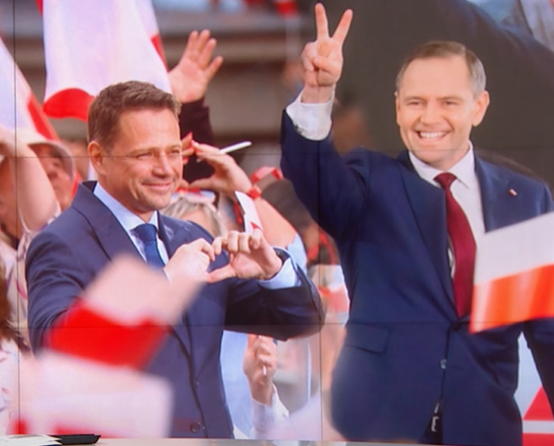Conservative candidate Karol Nawrocki has won Poland’s presidential runoff, narrowly defeating liberal rival and Warsaw Mayor Rafael Tatrosski. In what was described as a knife-edge election, Nawrocki’s thin but steady lead held through the night, securing a major political shift in Poland. Despite the presidency being a largely ceremonial role, Nawrocki’s victory is expected to have far-reaching consequences for Poland’s domestic policies, relations with the European Union, and stance on the war in Ukraine.
Karol Nawrocki Wins Polish Presidency
Conservative candidate Karol Nawrocki has won Poland’s presidential runoff, narrowly defeating liberal rival Trzaskowski In what was described as a knife-edge election, Nawrocki’s thin but steady lead held through the night, securing a major political shift in Poland. Despite the presidency being a largely ceremonial role, Nawrocki’s victory is expected to have far-reaching consequences for Poland’s domestic policies, relations with the European Union, and stance on the war in Ukraine.
Nawrocki’s win is a setback for liberals and centrists, who had hoped Tatrosski would usher in significant reforms, particularly in the judiciary and abortion laws—some of the strictest in Europe. Prime Minister Donald Tusk, who returned to power in 2023 after eight years of conservative rule under the Law and Justice Party (PiS), had planned major judicial reforms and a relaxation of abortion restrictions. However, those plans are now unlikely to proceed, with Nawrocki having the authority to veto legislation.
According to Hashim Ahelbarra, reporting live from Warsaw, Nawrocki’s momentum from the first round of voting was preserved thanks to strong support from conservatives and potentially far-right groups. Ahelbarra noted that Nawrocki’s presidency would resemble that of former President Andrzej Duda, known for using his veto power to block laws opposed by the conservative movement. This election result marks a major victory for the Polish right and a blow to pro-European reformists.
Nawrocki ran on a strong nationalist platform, with the slogan “Poles First”. He has criticized EU immigration policy, calling immigration a major problem for the bloc and proposing deportation centers for undocumented migrants instead of transit facilities. His eurosceptic stance has raised alarms in Brussels, especially as he opposes Ukraine joining NATO or the EU, and vows to never support sending Polish troops to Ukraine.
Reactions have poured in across Europe. German President Frank-Walter Steinmeier congratulated Nawrocki and emphasized the importance of stronger Polish-German ties. European Commission President Ursula von der Leyen also issued a statement, framing the moment as an opportunity to expand the EU-Poland partnership. Still, the sentiment in Brussels in recent weeks has been one of concern, particularly given Nawrocki’s alliance with PiS and his alignment with Donald Trump and Hungarian Prime Minister Viktor Orbán—leaders often at odds with EU leadership.
Nawrocki’s visit to the White House during his campaign and his open support for US President Donald Trump, who has been critical of NATO, underline the ideological shift. Analyst Peter Burus, head of the European Council on Foreign Relations in Warsaw, explained that although foreign policy in Poland is primarily a government domain, the president still plays a role in shaping the political narrative and can shrink the government’s room for maneuver, particularly when it comes to EU and foreign policy.
Burus observed that Nawrocki’s win is also a result of disillusionment among voters who had supported Tusk in 2023 but didn’t turn out this time. He described the outcome as a “yellow card or even a red card” against Tusk’s leadership. Tatrosski failed to mobilize those supporters, which cost him the presidency.
Regarding Ukraine, Nawrocki’s stance reflects both personal convictions and a rising anti-Ukrainian sentiment among sections of Polish society, especially on the right. As a historian, Nawrocki emphasizes historical disputes between Poland and Ukraine, which influence his reluctance to support Ukraine’s integration into NATO or the EU. While he is likely to continue supporting Ukraine militarily and back Poland’s rearmament, his presidency may hamper a proactive Polish foreign policy and diminish Poland’s leadership role in regional diplomacy.
Nawrocki’s presidency will not directly alter Poland’s NATO obligations, but his nationalist ideology and anti-EU rhetoric could create friction within both NATO and the EU. Burus noted that Poland may now appear divided in its approach to the EU and US, as Nawrocki is expected to criticize the government for being too pro-European and for allegedly undermining transatlantic ties.
As Poland enters this new political era, the implications of Karol Nawrocki’s presidency will resonate far beyond Warsaw. From domestic reforms and EU relations to Ukraine’s war and European security, his tenure is poised to redefine Poland’s role on the international stage—potentially pulling it closer to Trump-style nationalism and further from the European mainstream.

